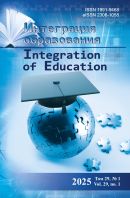UDC 373.574
DOI: 10.15507/1991-9468.087.021.201702.230-246
“UNIVERSITY LYCEUM” AS INTEGRATIVE MODEL OF PRE-UNIVERSITY EDUCATION AT A BACKBONE UNIVERSITY
Yuliya V. Grishina
Director of the Center of profound profile training of pupils “University lyceum”, Orel State University (95 Komsomolskaya St., Orel 302026, Russia), Ph.D. (Pedagogy), ORCID: http://orcid.org/0000-0001-8608-0977, This email address is being protected from spambots. You need JavaScript enabled to view it.
Introduction: the article describes the development of educational institutions for the needs of the regional economy in Russia. The focus is on students’ understanding of their careers, early identification of their professional trajectory and intensive development of future professional competencies for local labor market. This process underscores the diversification of the universities’ educational space, the integration of general, higher and further education programmes. The purpose of the article is to model the integrative pre-university educational space based on the synthesis of form al, informal and informational education.
Materials and Methods: the integrative approach as a theoretical and methodological strategy allows exploring the various structures of pre-university education and improving the quality of schooling in conjunction with the system, activity, competence, and synergetic approaches. The author reviewed the scholarly and methodological literature on the topic, compared, summarised, structured and modeled the data. In addition, they studied leading pedagogical experience and used the expert assessment method.
Results: the developed University lyceum model as a fundamental structure of continuous formation integrating resources and scientific and educational potential of the general, professional and additional education of the region is presented. The organization of network partnership as a method of an integration interaction contributes to the inclusion in the educational process of various actors of continuing education. It ensures the effectiveness of the conscious professional self-determination and self-development of the student’s personality.
Discussion and Conclusions: the author expects the proposed model of the pre-university educational institution will allow to motivate students of the lyceum to enter the university. This will contribute to the establishment of the university as a structure-forming component of continuing education in the region. Practical experience of implementing the integrative model of the University Lyceum education can be used in the design of an educational space of the continuing ed ucation.
Keywords: lifelong education; pre-university education; educational space; integration; network interaction
For citation: Grishina Yu.V. “University lyceum” as integrative model of pre-university education at a backbone university. Integratsiya obrazovaniya = Integration of Education. 2017; 2(21):230-246. DOI: 10.15507/1991-9468.087.021.201702.230-246
The author have read and approved the final manuscript.





























